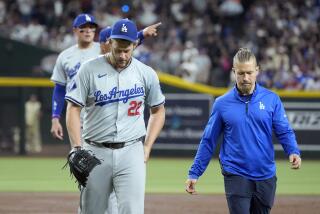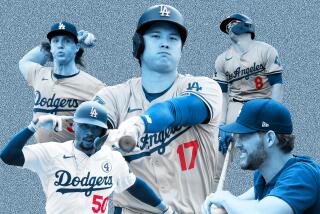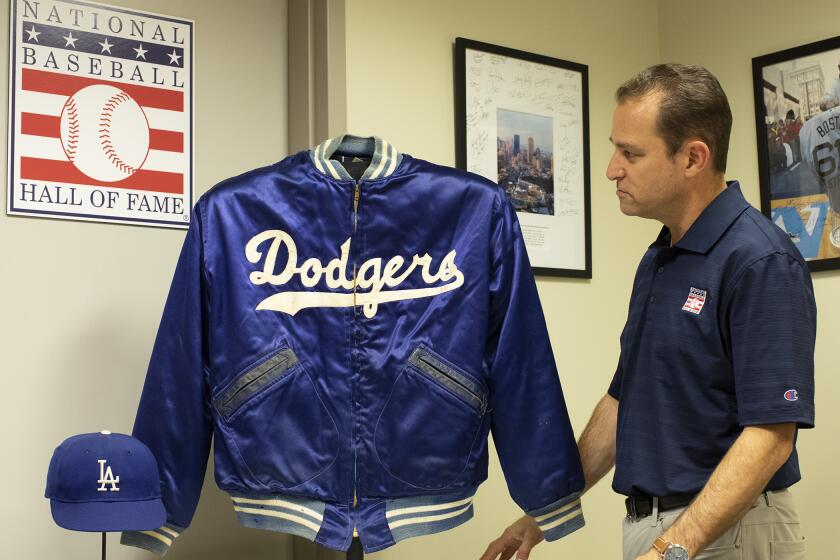Don’t Sell Him Short
- Share via
VERO BEACH, Fla. — Every big league regular has gone through what Cesar Izturis probably will go through if he wins the Dodger shortstop job, a rookie season filled with emotional highs and lows, anxiety and doubt and that never-ending question: Do I belong?
But if there is one Dodger who probably can relate most to such an experience, it is third-base coach Glenn Hoffman, who was 21 when he replaced Butch Hobson as third baseman for the Boston Red Sox in 1980 and played his first big league season in Fenway Park’s pressure cooker.
Head spinning, he went hitless in his first 15 at-bats, and veteran first baseman Tony Perez stepped in. After Hoffman’s fourth hitless game, Perez took the kid out to dinner, bought him a few drinks, told him to have fun, relax, stay loose.
The next day, Hoffman went four for four, a triple, two doubles and a single against Kansas City’s Paul Splittorff. That was the beginning of a decent rookie season for Hoffman, who hit .285 with four home runs and 42 runs batted in.
“I’ll never forget that,” Hoffman said of his dinner with Perez. “It was a veteran guy showing confidence in you. He made me feel like I was part of the team.”
Sometimes, that’s all it takes. When Dodger first baseman Eric Karros was a rookie in 1992, veterans Roger McDowell, Brett Butler and Kevin Gross went out of their way to include him in team activities, taking him out to dinner on the road, talking about their big league experiences in the clubhouse.
“At that stage, that comfort can translate to comfort on the field,” Karros said. “Young guys question whether they belong, and if you include them in on-field and off-field activities, they feel part of the group.”
Many have questioned the wisdom of a big-market team with a payroll in excess of $100 million, a team that considers itself a playoff contender, starting a 22-year-old kid with a mere 46 games of big league experience at shortstop, the most demanding defensive position on the field next to catcher.
The Dodgers believe Izturis, acquired in a winter trade with Toronto, has the physical skills to handle it--he is quick and athletic and has shown soft, sure hands and a strong arm in spring drills and exhibition games, and Dodger scouts rave about his instincts.
The speedy Izturis, considered a good bet to beat out incumbent Alex Cora this spring, hit .269 for the Blue Jays last season and is hitting .364 in the spring. He has the potential to steal 40 bases.
The two biggest questions: Can he handle the pressure of the big leagues? Can he handle the rigors, both physical and emotional, of a 162-game big league season?
“It’s a matter of him letting us know when he’s ready,” Manager Jim Tracy said. “You put him in situations and observe how he handles them. You let him tell you how much he’s ready to take on. That’s the approach we’ll take. We’ll give him opportunities and see how he responds.”
Izturis, who has played winter ball in his native Venezuela the last four years, responded well to his first dose of the big leagues. Called up to replace the injured Homer Bush in 2001, Izturis made his major league debut in Fenway Park on June 23.
The first Red Sox batter of the game, Jose Offerman, hit a grounder to Izturis, who fielded it cleanly and threw out Offerman at first. He also got a hit off Frank Castillo in his first major league at-bat.
“I was so excited I couldn’t even sleep the night before,” Izturis said. “Being in Fenway Park with that crowd, it was a great experience, and that should help me.”
But what if that first grounder had rolled through his legs?
“That would have rattled me,” Izturis admits.
How rookies respond to such adversity is the best indication of whether they can play in the big leagues.
“You’re going to have good days and bad days, and the veteran players can help you get through the bad days,” Hoffman said. “I tried to be too perfect when I first came up. You can’t. The intensity of playing in the major leagues every day ... you can’t match that.”
Hoffman, like most rookies, experienced growing pains.
“The biggest thing when I went to the major leagues was facing five starting pitchers who were good,” Hoffman said. “In the minor leagues, you’d face one or two good starting pitchers [per team]. And the quality of the guys coming out of the [big league] bullpen was better.
“Defensively, the game is faster, the ball is hit harder, the players run faster and make better plays against you. There’s a concentration level you have to have on every pitch. There’s no relaxation. Actually, there is, but that’s what you have to learn.”
Rookies must learn how to control their nerves.
“Mistakes come when you get into situations where ... it’s not that you panic, but you begin to react real quick,” Karros said. “You have to slow the game down. If your mind is racing all the time and you’re reacting to everything, you’re always going to be a step behind.”
Izturis is more mature than many 22-year-olds. He’s married and has a 2-year-old son, has played with numerous big leaguers in Venezuela and in two Caribbean World Series.
Izturis fared pretty well in his first taste of the big leagues, committing only three errors in 197 chances for Toronto during his three-week stint as a starter last June and July and in a reserve role as a September call-up.
“I don’t want to press or get caught up in trying to impress everybody, I just want to play my game,” Izturis said. “My whole career, I’ve played good defense, and in winter ball I concentrated on offense, improving my on-base percentage, being selective at the plate. The best way to open some eyes is to relax and control yourself.”
More to Read
Are you a true-blue fan?
Get our Dodgers Dugout newsletter for insights, news and much more.
You may occasionally receive promotional content from the Los Angeles Times.










